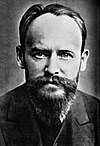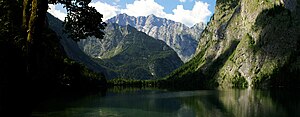Bavaria


Bavaria, officially the Free State of Bavaria, is a state in the southeast of Germany. With an area of 70,550.19 km2 (27,239.58 sq mi), it is the largest German state by land area, comprising roughly a fifth of the total land area of Germany. With over 13 million inhabitants, it is the second most populous German state behind North Rhine-Westphalia, but due to its large physical size its population density is below the German average. Major cities include Munich (its capital and largest city, which is also the third largest city in Germany), Nuremberg, and Augsburg.
The history of Bavaria includes its earliest settlement by Iron Age Celtic tribes, followed by the conquests of the Roman Empire in the 1st century BC, when the territory was incorporated into the provinces of Raetia and Noricum. It became the Duchy of Bavaria (a stem duchy) in the 6th century AD following the collapse of the Western Roman Empire. It was later incorporated into the Holy Roman Empire, became the independent Kingdom of Bavaria after 1806, joined the Prussian-led German Empire in 1871 while retaining its title of kingdom, and finally became a state of the Federal Republic of Germany in 1949.
Bavaria has a distinct culture, largely because of its Catholic heritage and conservative traditions, which includes a language, cuisine, architecture, festivals and elements of Alpine symbolism. It also has the second-largest economy among the German states by GDP figures, giving it the status of a wealthy German region.
Contemporary Bavaria also includes parts of the historical regions of Franconia and Swabia, in addition to Altbayern. ( Full article...)
Selected article

Fußball-Club Bayern München e. V. (FCB, pronounced [ˈfuːsbalˌklʊp ˈbaɪɐn ˈmʏnçn̩] ⓘ), also known as FC Bayern (pronounced [ˌɛft͡seː ˈbaɪɐn] ⓘ), Bayern Munich, or simply Bayern, is a German professional sports club based in Munich, Bavaria. It is best known for its professional men's association football team, which plays in the Bundesliga, the top tier of the German football league system. Bayern is the most successful club in German football history, having won a record 33 national titles, including eleven consecutively from 2013 to 2023, and 20 national cups, along with numerous European honours.
Bayern Munich was founded in 1900 by eleven players, led by Franz John. Although Bayern won its first national championship in 1932, the club was not selected for the Bundesliga at its inception in 1963. The club had its period of greatest success in the mid-1970s when, under the captaincy of Franz Beckenbauer, they won the European Cup three consecutive times (1974–1976). Overall, Bayern have won six European Cup/UEFA Champions League titles (a German record), winning their sixth title in the 2020 final as part of the Treble, after which it became the second European club to achieve the feat twice. Bayern has also won one UEFA Cup, one European Cup Winners' Cup, two UEFA Super Cups, two FIFA Club World Cups and two Intercontinental Cups, making it one of the most successful European clubs internationally, and the only German club to have won both international titles. Bayern players have accumulated five Ballon d'Or awards, two The Best FIFA Men's Player awards, four European Golden Shoe and three UEFA Men's Player of the Year awards, including UEFA Club Footballer of the Year. ( Full article...)
Selected biography

Christian Morgenstern (May 6, 1871 in Munich– March 31, 1914 in Meran) was a German author and poet from Munich.
Morgenstern's poetry, much of which was inspired by English literary nonsense, is immensely popular, even though he enjoyed very little success during his lifetime. He made fun of scholasticism, e.g. literary criticism in "Drei Hasen", grammar in "Der Werwolf", narrow-mindedness in "Der Gaul", and symbolism in "Der Wasseresel". In "Scholastikerprobleme" he discussed how many angels could sit on a needle. Still many Germans know some of his poems and quotations by heart, e.g. the following line from "The Impossible Fact" ("Die unmögliche Tatsache", 1910):
- For, he reasons pointedly / That which must not, can not be. (German: "Weil, so schließt er messerscharf / Nicht sein kann, was nicht sein darf.")
Quotes
- Home is not where you live, but where they understand you.
Christian Morgenstern (poet)
- So certainly, if we can tell evil stories to make people sick, we can also tell good stories that make them well.
Rainer Werner Fassbinder (film director)
- Hopefully it won't be worse than it is already.
Selected image

Did you know?

- ...that there is a Bavarian citizenship (as opposed to a German citizenship)? Actually, the Bavarian constitution (Bavaria has a separate constitution that exists alongside the German constitution) explicitly provides for it in articles 6 and 7. Specifically, you become a Bavarian citizen by birth, by marriage or by being naturalized.
Subcategories
Topics
Related portals
Germany state portals
WikiProjects
Things to do

- Requested articles:
- Help assess articles supported by WikiProject Bavaria
- Help suggest content for usage in this portal by using the archive links to obtain instructions
- Write Bavarian topics if you see a redlink which is worthy of an article
- Cleanup and expand stub-class articles relating to Bavaria
Wikipedia in Bavarian languages
Associated Wikimedia
The following Wikimedia Foundation sister projects provide more on this subject:
-
Commons
Free media repository -
Wikibooks
Free textbooks and manuals -
Wikidata
Free knowledge base -
Wikinews
Free-content news -
Wikiquote
Collection of quotations -
Wikisource
Free-content library -
Wikiversity
Free learning tools -
Wikivoyage
Free travel guide -
Wiktionary
Dictionary and thesaurus










